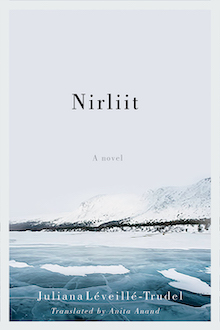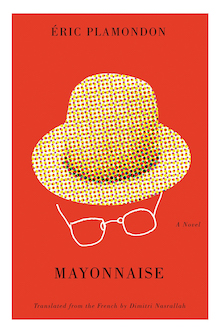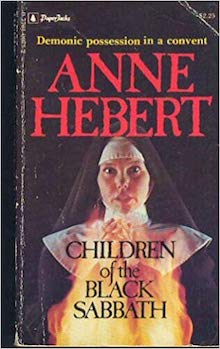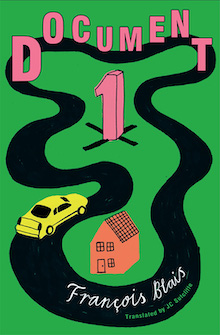Véhicule Press/Esplanade Fiction & BookThug/Book*Hug [P.T. Smith Redux]
This really is the P. T. Smith-inspired post. As you likely know, Patrick has been writing weekly posts for Three Percent this month about some of his favorite works of Quebec literature. (See this post and this one.) He’s one of the few Americans I know (maybe the only one?) who is deep into Quebec lit, so deep in fact that he’s already stated that if he beats me at the next ALTA Publishing Battle (an annual occurrence in which I challenge ALTA translators to some dumb game—mechanical bull riding, air hockey, cage dancing, Geeks Who Drink trivia—and the first to beat me gets to do a book with Open Letter) we have to do a Quebec title of his choosing.
Spoiler: No one ever beats me.
But I’m tempted to throw it this year! As I’ve been discovering all month, there are a number of interesting presses bringing Quebec literature into English, but given the quality of these books, the wealth of untranslated and out-of-print titles, and the fact that it might be worth immersing oneself in Canadian culture given the possibility that in 2020, we’re, once again, all going to be wanting to move north of the border—given all of this, it seems like a good time to add to the list of countries we’ve published from.

Which brings me to Véhicule Press. I only really became aware of Véhicule (and their fiction imprint, Esplanade Books) thanks to P. T. They have sent a few books our way in the past (most notably, the Éric Plamondon book), but not all of their translations are distributed in the U.S., and given how many books pass over my desk . . . it’s hard to stay on top of everything.
(Also, that’s kind of a lie. All those books that come in? They’re stacked around my office. And the main Open Letter office. In boxes in the packing room. On my “to review” shelves. There are crannies of our space that I’m not even aware exist because they’re packed with books. We have more books in our office than 90% of Americans read it their lifetime. AND I LOVE IT. BRING THEM ALL ON.)
On Wednesday, we’ll be running an interview with Dimitri Nasrallah, author, translator of Éric Plamondon, and editor of Esplanade. But as a bit of a prelude, I thought I’d give a bit of background on yet another Canadian press y’all might be interested in.
The “About Us” page on their site gives a rundown of the press’s physical history—and an overview of key employees—but this bit from their latest catalog is a pretty powerful summary of what they’re up to:
We’ve been ruminating on the number 45 for good reason lately—it’s our 45th anniversary. But a more significant number is 494, the number of books we’ve published since 1973. Great poetry, challenging fiction, and essential non-fiction from writers across Canada, with a focus on the literature of Quebec.
It’s always nice to encounter an indie press older than you are . . .

Outside of an assumption that the Canadian government has screwed First Nations communities over the course of history—although maybe not as bad as the American government?—I know next to nothing about this aspect of Canadian life. Which is the main reason I picked up Nirliit by Juliana Léveillé-Trudel, translated from the French by Anita Anand, to read for this post. It’s new, it’s written by a woman, and it’s about a very different part of Quebec than what I’ve been reading and writing about so far.
This book is shockingly powerful. Even if you can more or less guess the situation of the area that Léveillé-Trudel writes about—poor, alcoholic, somewhat self-destructive, ignored by the government, taken advantage of by the private mining industry, yet beautiful and filled with humans who deserve more and deserve to have their voices heard—reading it is viscerally intense.
The first narrative, “Eva,” is about the sudden disappearance of the narrator’s friend. For years, the narrator has, like Léveillé-Trudel herself, been going to the northern part of Quebec (Salluit in the case of Nirliit) over the summer months to work with the people there.
We are the new white missionaries. We preach healthy living. Don’t smoke, don’t drink, don’t take drugs, don’t eat fast food, eat more fruit and veggies, get eight hours of sleep every night, go to bed early, exercise, don’t skip school or work, don’t litter, slow down when you’re driving your quads, wear a life vest when you’re in your boats, keep your firearms out of the reach of children, practice safe sex, don’t swear, say please and thank you when you ask for something, vaccinate your children and sterilize your dogs. You must find us incredibly irritating.
This particular summer, the narrator gets off the plane and Eva isn’t there. Why? Well, we find out one page later from Eva’s former co-worker that, “He threw your body in the water, your fragile little body into the dark, rocky waters of the Hudson Strait.” The rest of this section of the novel is simultaneously an exploration of the community of Salluit and an investigation to identify who the “he” was who tossed Eva’s body into the water and why.
Detailing the boom-and-bust cycle of life in Salluit (which reminds me a bit of Gesell Dome), the way the money from the mines is immediately spent on TVs and four-wheelers, and $200 10oz bottles of vodka (shit is expensive up north) leaving wives and children and everyone malnourished, ill-prepared for the future; detailing the way in which violence permeates everything and how life is lost so casually, either at the hands of a jealous man or at one’s own hands (there was a rash of teen suicides in the area for a while), or thanks to that dangerous combination of drunkenness and treacherous weather conditions; detailing how hopeless everything seems as pricey new condos are built for non-natives to inhabit, worksites populated by southerners working up there for the money and the beautiful women. It’s bleak, it’s emotional, and it ends with Eva’s death feeling like a statistic in the most gut-punch way possible.
That section, which is more-or-less a first-person account of a white woman recognizing her place in this particular community that she’s absolutely in love with—for its timelessness, its self-sufficiency, its children who are raised by the community, its resilience—and its historic struggles, transforms in part two (“Elijah”) into a much more fictionalized narrative about a heartbreaking love-triangle.
Elijah is Eva’s son. He’s married to Maata, whose daughter Cecilia is maybe Elijah’s. She works in the cafeteria for the construction workers, where she meets and falls in love with Felix, a heart-broken divorced man from Quebec City who would really rather be able to win back his ex-wife. Given this set-up, you already know things are not going to go well. But as a reader, having just read an 80-page description of daily life in this part of the world . . . It’s like the first half of the book provides the landscape necessary for allowing this personal tragedy to have the largest impact.
It would be weird to read only the second half of this book. The emotions at play are totally universal, and in a different setting, with a few tweaks, this could be a Lifetime movie. But after being immersed in this particular community—not to mention the way in which this love story is told in parallel with a hot shot rapper’s failed attempt to find a new life in Montreal—the book embraces a sort of localness that puts it in conversation with other stories of this type, rather than being subsumed by pre-existing narrative tropes.
She knew. She knew that every spring you hear your mother’s voice scream louder than the roar of the ice. She knew that this year you would get into your canoe again with painful impatience. She knew that you would disappear for a few days to look for ghosts until you came back to your senses. She knew and yet she turned her back on you, during the spring thaw; she was nibbling on another man’s neck. And you, you saw thousands of women floating between the blocks of ice, like every year when the banks of the fjord crumble, but for the first time, Maata wasn’t there with you.

If I had had the time, I would’ve also read both Éric Plamondon books in preparation for this post. These are the first two volumes of the 1984 Trilogy and man, I’m a sucker for trilogies. (There is a month of these posts that I’ve been planning for a while now, but can’t enact until a third volume of a trilogy I’m not ready to name yet comes out. For whatever silly reason, trilogies appeal to twelve-year-old Chad, who read all the comic books and checked out any book from the library that held the promise of several more connected volumes. That ongoingness . . . the soap opera of it all is so addictive to me.) Furthermore, and I’m not lying in the least, I’ve had Hungary-Hollywood Express on my shelf at home for months and months now, initially because I was going to give it to Brian Wood (Two Month Review co-host, author of Joytime Killbox forthcoming from BOA Editions), but then hedging that because I think I might want to read it first . . . It’s about Johnny Weissmuller (1904-1984), who is mostly known for playing Tarzan, but led a pretty wild life.
The main reason I wanted to give it to Brian? Well, he’s writing an absurdist novel about Las Vegas (I won’t say more right now), and when this came in, I randomly opened the book to Chapter 40: Jungle Hut, Inc.
At the beginning of 1969, an idea that had been kicking around for a while in Johnny’s head takes shape. He gives it a name: Jungle Hut, Inc. He hopes to branch it out into four ventures: Jungle Hut restaurants, Johnny Weissmuller fruits and vegetable markets, Johnny Weissmuller’s Safari Hut gift shops, and the Johnny Weissmuller Ungawa Club Lounges. But apart from a few health-product shops in Los Angeles, St. Louis and Chicago, the multinational effort crashes before taking off.
In 1973, Johnny Weissmuller hits rock bottom. [. . .]
After the galas and official openings of municipal pools, Johnny takes a job as a host at Caesars Palace. At the time, it’s the biggest hotel in Las Vegas, but he’s only there to do minor walk-on appearances. He’s there to get people chattering: “Did you see that? That was Tarzan who said hello and gave us our menus. Imagine that, at Caesars Palace they can afford to pay the one, the true, the only Tarzan!”
People don’t know that Weissmuller is ruined. They don’t know that he played Jungle Jim all those years just to pay rent. He has nothing to look forward to ahead of him. He’s at Caesars not to amuse himself, but to survive.
Anyway, there’s a bit more about this in tomorrow’s interview, so stay tuned. And hopefully we’ll write more about this before the third Plamondon volume comes out.

If you thought that Véhicule Press bit was the only P. T. Smith action you were going to get in this post then you’re probably not a regular reader . . .
Last week, P. T. wrote about Anne Herbert’s Kamouraska. Here’s his summary:
Kamouraska is based on a true story. In the early nineteenth century, Elisabeth d’Aulnières married Antoine Tassy, well-off, land-owning man, “squire” of Kamouraska. He’s awful to her. She falls in love with an American doctor and murders Tassy. Later, she remarries. Years later, many, many children later, that husband is dying, and it’s time for Elisabeth to turn towards her memories, confess her past to herself. The movements from past to the present and back can happen quickly, though as the novel goes on, the story of her life with Tassy becomes more and more linear, more consistently told. At first she is afraid to go there, to think of the horrors she lived through, and the horror she inflicted, not only murdering Tassy.
 Cool, cool. Sounds like a good book! Even with this hokey-ass cover, I’m planning on reading it at some point. Honestly.
Cool, cool. Sounds like a good book! Even with this hokey-ass cover, I’m planning on reading it at some point. Honestly.
Especially since our library has the mass-market version. If only it were a trilogy! Then it would be appealing to all my nostalgias. (I’m kind of over nostalgia again. Twin Peaks: The Return is the best art ever about nostalgia—and the best TV show ever—and really reworked my own desires about wanting to go back to a different time . . . It raised some really interesting questions about the relationship between artist, monumental artwork, and fan expectations. Which is something I expected, in part, from Go Ahead in the Rain, a really fine book about A Tribe Called Quest, but one that was maybe too wedded to historical fact, too loose in structure, and too lacking in a compelling through-line. It’s a good book, but one that left me less interested in the words and much more interested in playing the Tribe catalog on infinite repeat. Which is maybe the point?)
But forget Kamouraska—which, by the way, sounds way too Russian to play in 2019 America—let’s talk about Children of the Black Sabbath, which Patrick tweeted about over the weekend:
One of the greatest horror novels you’ve never read, Hébert’s dualistic perception of existence is seen in Children of the Black Sabbath, set in Quebec in 1944, with flashbacks to the preceding decade. Satanic rituals in an isolated mountainous area and religious ceremonies performed in the Convent of the Precious Blood are juxtaposed by means of narrative shifts. Witchcraft, demonic possession, exorcism, and satanic initiation find their corollaries in prayers, dedication to God, Mass, and initiation into cloistered life. Children of the Black Sabbath is unsettling in its depiction of sordid sexual initiation in the world of sorcerers and deceit within the walls of the convent. As do many of Hébert’s other works, this novel probes the traditional conception of reality, suggesting the existence of another world that is dark and powerful.
The hell?! This sounds absolutely wild. And, assuming Hérbert swerves more lit than pulp, this could be amazing . . . I’m interlibrary loaning it as I type . . .
Which reminds me—and here we go, off-the-rails once again, right on schedule at 2,365 words—to mention that Google Home sucks. I got a free little mini Google speaker thing from Spotify (no idea why) a few months ago, and so far, I’ve figured out three things:
- When I say “Hey Google,” it responds about as often as my kids. But when my wife says, “Hey Google,” it’s totally on point and ready to do whatever she asks. Most mornings I can be found in a bath towel screaming “GOOGLE. GOO-GLLLLEEEE. PLAY PAVEMENT.” [silence] “GOOOGLE. HEY. HEY. GOD DAMN IT. GOOOOOOOOOGLLLLLLLEEEEEE.”
- It’s good for playing music from Spotify—if you control it as a speaker from your phone.
- It sort of gives you the weather. If you’re my wife and ask it for “current weather in Rochester” then you get useful info. If you say, “hey! Hey Google! The weather!” it’ll tell you about global warming and Scottsdale, AZ.

Patrick really wanted me to write about Book*Hug this month, but I just couldn’t get around to it properly. How can I keep up with MLB Trade Rumors, our books, my class, working out, drinking, going to concerts (last week it was El Ten Eleven, who is one of my favorites, and I got Car Seat Headrest tickets for June and can die happy in July), and watching college and NBA basketball, and . . . oh, yeah, having a nearly-one-year-old who is funny as can be and happy in a way that I hope he’ll never forget, AND reading all the books I want to read? I already barely sleep . . .
Anyway, this is long AF, but here’s BookThug/Book*Hug’s mission:
Book*hug (formerly BookThug) is a radically optimistic Canadian independent literary press working at the forefront of contemporary book culture. Our mandate is to publish innovative and contemporary books of literary fiction, literary nonfiction, poetry, literature in translation, and drama.
Celebrating adventures in literary publishing since 2004, Book*hug’s mission is to publish emerging and established literary writers whose work meaningfully contributes to and reflects contemporary Canadian culture and society. We seek to acquire books that are bold, innovative and take risks; work that feels necessary and urgent. We believe in writing that challenges and pushes at the boundaries of cultural expectations.
Book*hug Press has made an impressive mark on the Canadian literary landscape in a relatively short span of time. This was helped by a promise we made early on to remain open to change and be adaptable to the changing needs of the culture to which the press contributes. As such, our books are known for making significant contributions to contemporary Canadian literary culture.
We are deeply committed to building a more inclusive CanLit by publishing culturally diverse voices whose work has been historically underrepresented in the publishing landscape. We strongly support feminist writing. When acquiring manuscripts we carefully consider questions such as: whose voices are missing and who are the storytellers that we need most right now? We aim to ensure ensure that our catalogue is reflective of an inclusive and multicultural Canada. We especially welcome work by Indigenous writers, writers of colour, writers from the LGBTQ2S+ community, deaf and disabled writers, as well as women and women-identifying authors.
We support our literary writers through attentive editing and by facilitating dialogue about the spaces and traditions they work within. We help grow their readership through strategic publicity and marketing campaigns. We publish our books in various formats (print, electronic, audio) and distribute them through as many channels as possible. We also produce elegant and attractive editions with careful attention paid to the aesthetics of design.

Since we already reviewed Mama’s Boy a while back—a book those shitty-ass Three Percenters will not appreciate, and yes, I am calling out your lame-ass militia because every one of you who clicks on this ensures that my Three Percent Googles higher than your website:
Chad: HEY GOOGLE
Google: Good evening, Chad, you do not have to yell. How can I assist you?
Chad: WHO IS THE MOST POPULAR THREE PERCENT
Google: I am not sure I understand.
Chad: HEY GOOGLE GOOGLE THREE PERCENT.
Google: Three divided by . . .
Chad: HEY GOOGLE GO EFF YOURSELF.
Google: I don’t appreciate your sentiment, but I respect your viewpoint.
Chad: God dammit. Ok. OK. HEY GOOGLE, WHAT IS THE TOP RESULT FOR “THREE PERCENT”?
Google: Let me Google that for you . . .
Chad: . . .
Google: . . . there seems to be a problem. Try again in a few moments.
Chad: DAMN DAMN GOD DAMN.
Google: Oh dear.
Chad: HEY GOOGLE . . . HEY. HEY GOOGLE. WHAT’S UP? GOOGLE. HEY GOOGLE. WHAT . . . IS THE . . . TOP . . . TOP . . . RESULT FOR . . .”THREE PERCENT”?
Google: Let me search . . . Three Percent at the University of Rochester.
Chad: SUUUUCCCCKKKKK ITTTTT!!!!
Google: Oh dear!
You have no idea how hard my mornings are. Anyway, since we reviewed Mama’s Boy, I figured I would read this book from Book*Hug. But I didn’t. But I think François Blais’s book, translated by J. C. Sutcliffe, deserves attention!
Tess and Jude live in small-town Quebec and spend their time travelling all across North America—using Google maps—which provides them the luxury of adventure while remaining in the comfort of their own home. But Tess and Jude are dreamers, and their online adventures eventually give rise to a desire to actually travel somewhere. They settle on Bird in Hand, Pennsylvania, and begin scheming to raise the cash they’ll need for the trip.
After a series of hilarious ideas that never pan out, they turn to a local experimental author (who has a major crush on Tess) and convince him to apply for an arts council grant on their behalf. But when they actually receive the grant money, can they pull it all together for a real adventure?
Funny, smart and wonderfully human, Document 1 is a tragicomic tale of two dreamers and their quest for adventure, as well as a satirical take on the world of arts and letters.
Hey, Book*Hug? Next time around, I want to interview you first. And, you know what? Every book you send us this year, we will review. Like, a real review. HOLD ME TO THIS.
*
But for the handful who are still here, I’ve been thinking a lot about how I order my work life. As you know, my computer was lost/stolen/unintentionally taken in ABQ at Winter Institute, and I’ve been rebuilding my life. Rebuilding the entire subscribers database. Recalculating our monthly sales reports. Redoing our NEA grant (which, ugh, I’m already getting so much heat for since our grant last year was a reduction whereas a few years ago, we were equal with Coffee House) from scratch. Calculating overdue royalty statements. I’m totally zen about most everything else that was lost—all my essays, all the letters to subscribers, all my strategic plans . . .
And the thing is—to complain for a second, just one, give me this, please—I was backing up my files daily. But. And a big old FUCK YOU APPLE but—my last Time Machine backup didn’t complete properly. Was I notified of this? Nope. Would I ever have known about it if I hadn’t have had to rely on that particular back up? Nah.
But Apple, because they are “geniuses,” created a system by which your computer is backed up daily, BUT, if the final backup is never finished? All files are inaccessible. Game over. You lose everything.
Yes, I know it’s dumb.
Yep, many people are trying to hack (by request) into the 300 GB file on our server that is “inaccessible.”
If you want to try and solve the puzzle—email me. Until then . . . DIE APPLE.
*
But, right, yes, I’ve been thinking about ordering my work-life priorities. It’s like work triage. I get 200+ emails a day, which aren’t even necessarily related to my main job . . . So I . . . well, “HEY GOOGLE! HOW SHOULD I PRIORITIZE MY EMAILS?”
- Emails about receiving money from wealthy donors, or leads on wealthy donors. Or donors of any kind.
- Emails about sales of books. Book clubs, bookstore selections, booksellers who love our books, individuals who want to order things.
- Invitations to trips abroad. Probably would be higher, but I haven’t replaced my passport yet, so this option is subconsciously stressful. If someone tries to leave the U.S. with my passport, they will be arrested. That’s baller. NCIS THAT MOFO.
- Invitations to speak on panels. Because, let’s be honest, I like that attention. Who doesn’t? Invite me to interview someone on a stage, or, really, just give me a microphone, and I’ll answer you.
- Formal communications from the University of Rochester. My greatest fear is losing my job. Any “Subject: Security for Chad W. Post” email is being OPENED.
- Literary gossip. Because, c’mon. Who doesn’t want to hear some random shit about the latest L—- S—-.
- Submissions. There are so many . . . And they’re all so good . . . HEY GOOGLE! GOOGLE. HEY HEY. TELL ME WHICH BOOKS TO PUBLISH. “I’m sorry but we live in a digital age run by algorithms . . .”

[…] Juliana Leveillé-Trudel’s Nirliit (translated by Anita Anand) [Ed. Note: YES.] […]